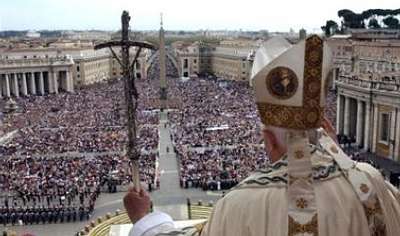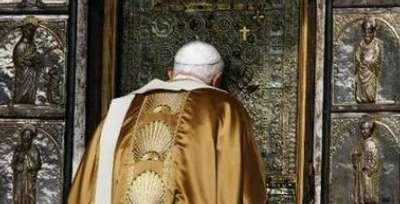For et par dager siden så jeg gjennom noen gamle e-poster på datamaskinen min, og kom over en diskusjon om felles nattverd/ kommunion mellom katolikker og lutheranere som flere ganger de siste årene har blusset opp i Norge. I mine økumeniske studier i Roma, derimot, er det klart og respektert fra alle at så langt har dessverre ikke tilnærmingen mellom katolikker og protestanter ennå kommet. I Norge er dette fortsatt ikke klart for alle, og den gangen, i august 2004, formulerte jeg meg slik i sakens anledning:
”I Vårt Lands spalter fortsetter samtalen om felleskommunion mellom katolikker og lutheranere, og jeg gjerne si litt personlig om hvordan jeg opplevde dette i forbindelse med min konvertering i 1994.
Jeg hadde ca tre år før dette vært i USA for å studere luthersk kirkeliv, og hadde blitt påvirket en hel del av en mer høykirkelige og sakramental forståelse av den lutherske kirke enn jeg tidligere hadde møtt. I disse kretsene ble den lutherske kirke ikke definert som først og fremst protestantisk, men heller som en renset katolsk kirke. Jeg stilte meg da spørsmålet om ikke den katolske kirke etter hvert hadde blitt renset nok, slik at det ikke skulle være noen hindringer for å bli gjenforent med Roma. Jesu imperativ om at alle kristne skal være ett skulle jo helst lede oss bort fra alle splittelser blant de kristne.
Nå var disse argumentene likevel ikke nok til at jeg konverterte, først da jeg (utover høsten 1993) begynte å stille alvorlige spørsmål om gyldigheten av det lutherske embedet, fant jeg det umulig å fortsette som luthersk prest. Nå klarte jeg heldigvis den gangen å stoppe min argumentasjonsrekke før jeg nådde noen konklusjon: Jeg konkluderte ikke med at embedet og noen sakramenter i den lutherske kirke var ugyldige, men det ble stilt alvorlige spørsmål ved fundamentet for min lutherske prestetjeneste, og det kunne jeg ikke leve med.
Når vi i dag vurderer de katolske uttalelser om lutherske sakramenter, noe … (som tas opp i Vårt Lands spalter i august 2004) … , kan det kanskje være nyttig å se på disse i samme lys. Den katolske kirke sier helt tydelig at Gud virker gjennom de protestantiske kirkesamfunn, gjennom deres kirkelige handlinger og sakramenter, og når det gjelder dåpen er det heldigvis ingen tvil om at luthersk dåp regnes som fullt ut gyldig kristen dåp. Men når det gjelder de andre sakramentene (inkl. bispe- og prestevielsen og nattverden) blir det også sagt svært tydelig fra katolsk hold at protestantiske sakramenter ikke har bevart sakramentenes «mysteriums opprinnelige og hele innhold.»
I denne debatten er det kanskje ikke så fruktbart å spesifisere dette nærmere, kanskje er det ikke mulig. Kristus er tilstede i de protestantiske kirker og deres sakramenter, men man kan dessverre ikke si at de protestantiske sakramenter er fullt ut gyldige slik som i den katolske og i de ortodokse kirker. Denne forståelsen fører til at lutheranere og katolikker kan samarbeide om mange ting, men dessverre er det ennå ikke fullt kirke- eller nattverdfellesskap mellom oss.”


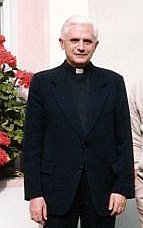
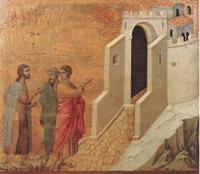 Teksten handlet mye om nattverden – hvordan vi gjenkjenner Kristus når vi mottar hans legeme og blod, og passet derfor godt til barna som den dagen for aller første gang skulle motta dette hellige sakrament.
Teksten handlet mye om nattverden – hvordan vi gjenkjenner Kristus når vi mottar hans legeme og blod, og passet derfor godt til barna som den dagen for aller første gang skulle motta dette hellige sakrament.
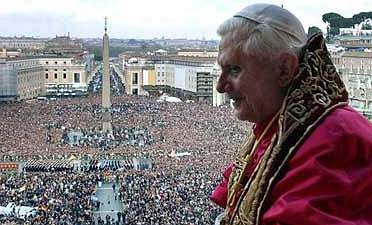 «Jeg er godt fornøyd med at Joseph Ratzinger nå er valgt til ny pave, sier Oddvar Moi. Ratzinger er kjent for å være veldig mild og vennlig, ryddig og ordentlig. Han har et tradisjonelt syn på kirkens tro og hans oppgave har vært å forsvare denne troen. Men Ratzinger er ikke den «panserkardinalen» en del har påstått at han er, sier Oddvar Moi.
«Jeg er godt fornøyd med at Joseph Ratzinger nå er valgt til ny pave, sier Oddvar Moi. Ratzinger er kjent for å være veldig mild og vennlig, ryddig og ordentlig. Han har et tradisjonelt syn på kirkens tro og hans oppgave har vært å forsvare denne troen. Men Ratzinger er ikke den «panserkardinalen» en del har påstått at han er, sier Oddvar Moi.